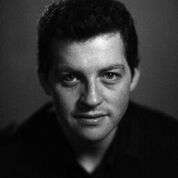|
Back
More than just well-schooled Calgary
Jack Singer Concert Hall
09/03/2015 - & September 6*, 2015
September 3, 2015: Solo Recital
Maurice Ravel: Gaspard de la nuit
Frédéric Chopin: Preludes Op. 28
September 6, 2015: Collaborative Recital
Franz Liszt: Die drei Zigeuner S. 320
Piotr Ilych Tchaikovsky: Romance “Den' li tsarit?“ Op. 47 No. 6
Johannes Brahms: Sonata for clarinet, Op. 120 No. 1 – Geistliches Wiegenlied for contralto, viola and piano Op. 91 No. 2
Dmitri Shostakovitch/Lena Auerbach: 24 Preludes for piano Op. 34: Nos. 10, 14, 15, 16, 19 & 24
Jean Françaix: Trio for clarinet, viola and piano
Isabel Bayrakdarian (soprano), Hsin-Yun Huang (viola), James Campbell (clarinet), Henry Kramer (piano)

H. Kramer (© Chris Krieger)
American pianist Henry Kramer has degrees from Juilliard and is currently studying for his doctorate at Yale University. His solo recital opened with a beautifully molded “Ondine”, the first of the three pieces in Gaspard de la nuit. This sculptural approach turned out to be evident in subsequent performances. In the second part, “Le Gibet” he arguably separated the notes too much, and went daringly subliminal in one passage – effectively so. In “Scarbo” the notes crept from the depths and we experienced more of his sensuous sculpting.
His other work was Chopin’s Preludes Op. 28, a piano masterpiece that can reveal just how well (or not) a pianist can handle a lengthy work that contains many short elements that must be instantly defined. This was a daring choice and the result was convincing, to say the least.
His encore was a well-controlled performance of György Ligeti’s Musica Ricercata No. 7, marked Cantabile, molto vivace, in which the right hand plays a wandering melody while the left hand maintains an ostinato.
His collaborative recital three days later featured the program also played by five of his fellow entrants. The introduction to the Liszt song brought forth a gamut of approaches from the six pianists and in his case it was notably playful. He gave the rapturous Tchaikovsky song lovely, full support.
The Brahms sonata was notable for a very fine slow movement, and in the jaunty final movement he obviously took cues from James Campbell. His contribution in the Shostakovitch work (where overall the viola is front and centre) brought drama and colour especially to Nos. 14 and 15. The Françaix work, with its close interchanges between the three performers, struck sparks. The Brahms lullaby went well (as usual).
Henry Kramer was chosen as one of the three finalists. His performances in the two final concerts can be read here and here.
ABOUT THE HONENS
The Honens International Piano Competition, named for its founding donor, held its first competition in Calgary in 1992. It is open to pianists between the ages of 20 and 30 who have no professional representation, and offers the richest prize of any of the world's many such competitions: a $100,000 first prize which comes with a three-year artist development program worth $500,000. The 2015 competition was the eighth.
The main objective of the competition is to discover “the complete pianist”, and here is the procedure: Earlier this year, interested pianists applied online, submitting information on their training and experience in performances and competitions. The Applicant Screening Jury selected 50 to participate in the quarterfinals, which consisted of 40-minute recitals (with audience) filmed in Los Angeles, New York or Berlin. Each pianist also made a taped 10-minute interview. These fifty recordings and the interviews were examined by a jury of four (Canadian pianist Stewart Goodyear, Israeli pianist Inon Barnatan, Japanese pianist Noriko Ogawa, and Mary Sigmond, president of a piano recital series in Minnesota).
Ten of the 50 were selected to come to Calgary for the semifinals (running for five days beginning Sept 3), during which each one performed a 65-minute solo recital (entirely different from the earlier 40-minute recital), and a 65-minute collaborative recital accompanying soprano Isabel Bayrakdarian, violist Hsin-Yun Huang, and clarinetist James Campbell. (Each pianist chose one of three programs for these collaborative recitals.) Each pianist had a two and one-half hour session with the collaborators, plus a dress rehearsal.
After the semifinal round, three pianists were chosen for the two final concerts with the Calgary Philharmonic Orchestra under Yan Pascal Tortelier. For the first concert they each chose a concerto from a list of classical era works, and for the second concert they played a work of their own choosing from the post-classical era. The jury for the semifinal and final rounds consisted of three pianists (Alessandra Ammara, Janina Fialkowska, and Pedja Muzijevic ) and four arts managers: Paul Hughes (General Manager of the BBC Symphony Orchestra), Jeremy Geffen (Director of Artistic Planning for Carnegie Hall), Charles Hamlen (a founder of IMG Artists), and Costa Pilavachi (Senior Vice President of Classical Artists and Repertoire for Universal Music Group).
The jury assigned scores to each segment of the process, with each of the solo and collaborative recitals worth 30% of the final score, and each of the two concerto performances worth 15%. Ten percent of the final score was based on a 15-minute interview (taped) with an arts journalist.
The next competition will be in 2018.
Complete information on Honens can be found on the website.
Michael Johnson
|